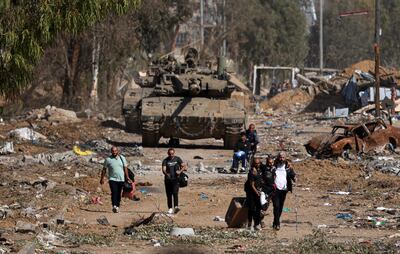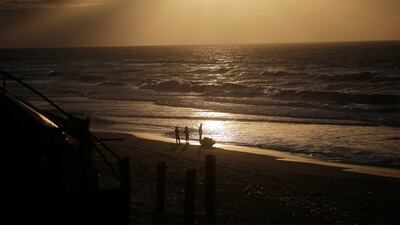Before war broke out in Gaza, my husband, two children and I would walk to the edge of the water to look over the most beautiful sea in the Middle East.
I was living in one of Gaza city’s most striking neighbourhoods, Southern Rimal, about 1km from the lapping shores of the Mediterranean.
That coastline is one of the few places where Gazan people could entertain themselves, at cafes regularly hosting birthdays, graduations and other celebrations.
Yes, we are human beings who can celebrate and enjoy our lives to the full.
The shore was where we would gather and discuss our hopes and dreams, an escape during hot summers and cold winters.
On Saturday, October 7, I had many plans. I thought I would take my three-year-old, Omar, to his kindergarten and then go and buy him new warm clothes as winter approached.
After that, I wanted to have some falafel – Gaza is known for having the most delicious falafel in the world – and foul, a stew of cooked fava beans.
I also planned to have breakfast with my parents as I had not seen them in a week. I can't bear not seeing my parents for more than a week.
Then, at 6am that Saturday morning, everything changed. The fate of Gaza changed. The sea of Gaza was no longer the same sea. The falafel lost its taste, suddenly just food to fill your stomach.
The small city of Gaza had entered its fifth war, but this time, it was different. This war carried the taste of revenge, the revenge of the Israeli army.
From the beginning, Israel made the decision to destroy my neighbourhood. They want to change the beautiful face of Gaza, hoping we would grow to hate it and seek refuge in other places, away from the devastation that now surrounds us.
However, they did not realise that Gaza remains in our hearts and we can never give it up, no matter what happens.

The war began, and the scramble to find safe places also began. I left my house, but no matter where I moved, I couldn't find a safe place for Omar and Qais, my one year old. The only place where I could guarantee their safety was inside my heart.
The biggest challenge I faced was balancing my work as a journalist and being there for my children. The continuous shelling forced us to move four times. My husband, who works as a photojournalist, was not always with us, meaning I was constantly worrying about his safety.
Each place we went was changed by devastation, places that used to bring us joy becoming a source of pain, as the Israeli army sought to break our determination and will.
I have now been away from my parents and family for more than two months. They made the decision to stay in the north, but I fled to the south, walking with my two children for more than 3km.
Throughout the journey, Omar walked by my side, listening to people discussing the Israeli tanks moving dangerously close to us, poised to fire its missiles if we disobeyed its orders.
He asked me, “Mama, where is the tank?” but I made sure not to let him see it, as I was afraid of his reaction. I hid him among the people around us.
This journey, made solely for the safety of my children, is one I will never forget.

Staying in the south, away from my family, breaks my heart. I cannot reach them and be certain of their safety. Likewise, they worry about my safety.
The war has dismissed us. I have no knowledge about my friends, neighbours or colleagues. We are running to survive, to bear witness to the brutality of this war. I hope that all the people I know are safe.
All the death makes it difficult to comprehend the silence of the world, which seems to believe that we do not deserve to live.
However, I am certain that we, the ones who are bravely fighting this war, truly deserve life. We will survive and become an example of courage and sacrifice.


